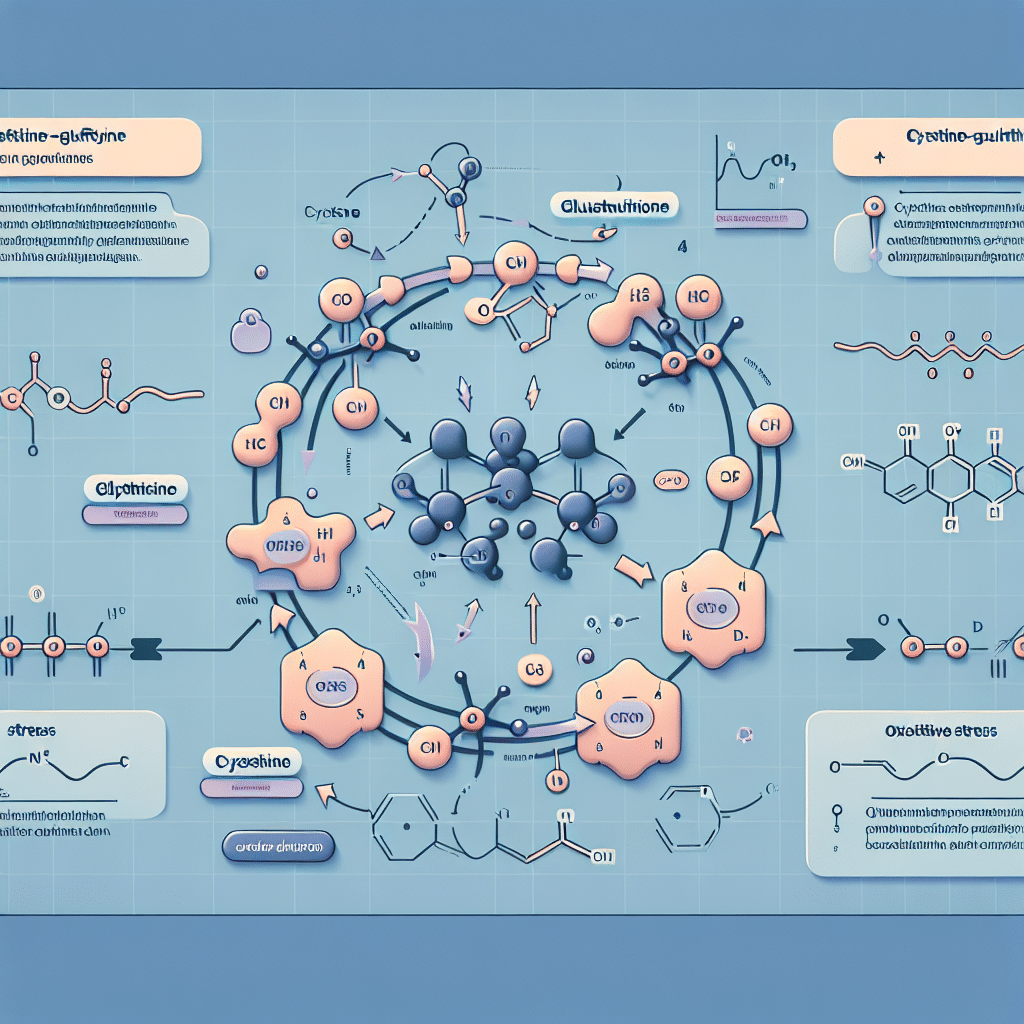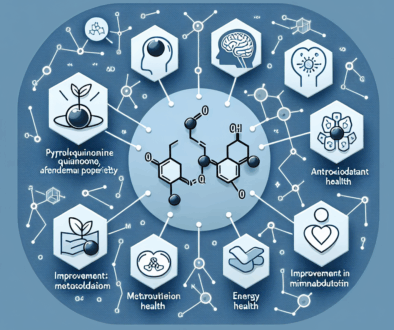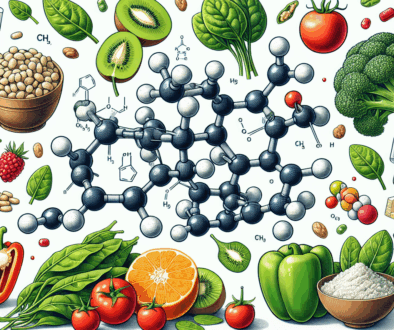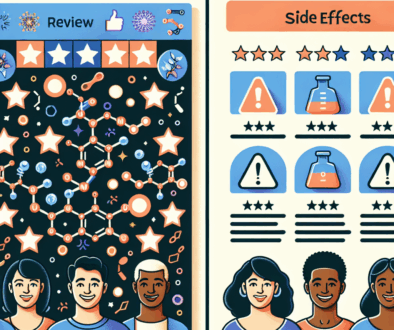Cysteine-Glutathione Disulfide Oxidative Stress: Explained
-
Table of Contents
- Cysteine-Glutathione Disulfide and Oxidative Stress: A Comprehensive Guide
- Understanding Oxidative Stress
- The Role of Cysteine and Glutathione in Antioxidant Defense
- How Cysteine-Glutathione Disulfide Protects Against Oxidative Stress
- Factors Influencing Cysteine and Glutathione Levels
- Implications for Health and Disease
- Conclusion: Key Takeaways on Cysteine-Glutathione Disulfide and Oxidative Stress
- ETprotein: Your Source for High-Quality Protein Products
Cysteine-Glutathione Disulfide and Oxidative Stress: A Comprehensive Guide

Oxidative stress is a term that has been widely discussed in the context of health and disease. It is a biological process that can lead to cellular damage and has been implicated in a variety of chronic conditions, including cancer, neurodegenerative diseases, and aging. Central to the body’s defense against oxidative stress is the cysteine-glutathione disulfide system. This article will delve into the role of cysteine and glutathione in protecting the body from oxidative damage, the mechanisms of oxidative stress, and the implications for health and disease.
Understanding Oxidative Stress
Oxidative stress occurs when there is an imbalance between the production of reactive oxygen species (ROS) and the body’s ability to detoxify these harmful compounds or repair the resulting damage. ROS are chemically reactive molecules containing oxygen, such as free radicals and peroxides. While ROS are a natural byproduct of the normal metabolism of oxygen and play a role in cell signaling and homeostasis, excessive amounts can lead to significant damage to cell structures.
The Role of Cysteine and Glutathione in Antioxidant Defense
Cysteine and glutathione are critical components of the body’s antioxidant defense system. Glutathione, a tripeptide composed of the amino acids glutamine, cysteine, and glycine, is one of the most potent intracellular antioxidants. It plays a key role in neutralizing ROS and maintaining the redox balance within cells.
- Cysteine: This sulfur-containing amino acid is a precursor to glutathione and is essential for its synthesis. Cysteine itself also has antioxidant properties and can directly scavenge free radicals.
- Glutathione: Glutathione exists in two forms within the cell: the reduced form (GSH) and the oxidized form (GSSG). GSH is the active form that can donate a reducing equivalent (H+ + e-) to neutralize ROS. During this process, GSH is converted to its oxidized form, glutathione disulfide (GSSG).
The ratio of GSH to GSSG within cells is often used as a measure of cellular oxidative stress. A high GSSG to GSH ratio indicates a more oxidized cellular state and greater oxidative stress.
How Cysteine-Glutathione Disulfide Protects Against Oxidative Stress
The cysteine-glutathione disulfide system works to protect cells from oxidative damage through several mechanisms:
- Direct Scavenging of ROS: Glutathione directly interacts with ROS to neutralize them, forming GSSG in the process.
- Regeneration of Antioxidants: Glutathione helps to regenerate other antioxidants, such as vitamins C and E, back to their active forms after they have been oxidized.
- Detoxification: Glutathione conjugates with toxins, making them more water-soluble and allowing for their excretion from the body.
- Enzymatic Role: Glutathione is a cofactor for several antioxidant enzymes, including glutathione peroxidase and glutathione S-transferase, which help to reduce peroxides and detoxify harmful compounds.
Factors Influencing Cysteine and Glutathione Levels
Several factors can influence the levels of cysteine and glutathione in the body, including:
- Diet: Dietary intake of cysteine-rich foods, such as poultry, yogurt, egg yolks, red peppers, garlic, onions, broccoli, Brussels sprouts, oats, wheat germ, and sprouted lentils, can boost glutathione levels.
- Age: Glutathione levels naturally decline with age, which may contribute to increased oxidative stress and vulnerability to age-related diseases.
- Health Status: Chronic diseases, such as diabetes and HIV/AIDS, can deplete glutathione levels, while acute illnesses and stress can increase the demand for glutathione.
- Lifestyle: Factors such as smoking, alcohol consumption, and exposure to environmental toxins can increase oxidative stress and deplete glutathione levels.
Implications for Health and Disease
The cysteine-glutathione disulfide system’s role in mitigating oxidative stress has significant implications for health and disease. Research has shown that maintaining adequate levels of glutathione can help protect against a range of diseases:
- Chronic Diseases: Adequate glutathione levels are associated with a lower risk of chronic diseases such as heart disease, diabetes, and cancer.
- Neurodegenerative Diseases: Glutathione has been shown to have neuroprotective effects and may be beneficial in conditions such as Alzheimer’s disease, Parkinson’s disease, and multiple sclerosis.
- Aging: Glutathione levels are linked to the aging process, and supplementation may help to mitigate the effects of aging and improve longevity.
- Immune Function: Glutathione plays a role in the proper functioning of the immune system and may enhance resistance to infection.
Conclusion: Key Takeaways on Cysteine-Glutathione Disulfide and Oxidative Stress
In conclusion, the cysteine-glutathione disulfide system is a cornerstone of the body’s defense against oxidative stress. Adequate levels of cysteine and glutathione are essential for maintaining cellular health and protecting against a variety of diseases. Factors such as diet, age, health status, and lifestyle can influence glutathione levels, and interventions to support glutathione synthesis and function may have significant health benefits. Understanding the role of this system can help individuals make informed decisions about their health and potentially reduce the risk of oxidative stress-related diseases.
ETprotein: Your Source for High-Quality Protein Products
If you’re looking to support your body’s antioxidant defenses, consider incorporating high-quality protein products from ETprotein into your diet. ETprotein offers a range of organic bulk vegan proteins that can help boost your intake of cysteine and other amino acids necessary for glutathione synthesis. Their products are characterized by a neutral taste, non-GMO, allergen-free attributes, and are suitable for a variety of industries, including nutraceuticals, pharmaceuticals, and food and beverage.
ETprotein’s L-(+)-Ergothioneine (EGT) products are particularly noteworthy for their antioxidant properties. EGT is a naturally occurring amino acid and is known for its role in protecting cells from oxidative damage. ETprotein provides EGT in various grades, including pharmaceutical, food, cosmetic, reference, and standard, with purity over 98%, making it an excellent choice for those looking to enhance their antioxidant defenses.
For more information or to sample their products, please contact ETprotein and email sales(at)ETprotein.com today.
About ETprotein:
ETprotein, a reputable protein and L-(+)-Ergothioneine (EGT) Chinese factory manufacturer and supplier, is renowned for producing, stocking, exporting, and delivering the highest quality organic bulk vegan proteins and L-(+)-Ergothioneine. They include Organic rice protein, clear rice protein, pea protein, clear pea protein, watermelon seed protein, pumpkin seed protein, sunflower seed protein, mung bean protein, peanut protein, and L-(+)-Ergothioneine EGT Pharmaceutical grade, L-(+)-Ergothioneine EGT food grade, L-(+)-Ergothioneine EGT cosmetic grade, L-(+)-Ergothioneine EGT reference grade and L-(+)-Ergothioneine EGT standard. Their offerings, characterized by a neutral taste, non-GMO, allergen-free attributes, with L-(+)-Ergothioneine purity over 98%, 99%, cater to a diverse range of industries. They serve nutraceutical, pharmaceutical, cosmeceutical, veterinary, as well as food and beverage finished product distributors, traders, and manufacturers across Europe, USA, Canada, Australia, Thailand, Japan, Korea, Brazil, and Chile, among others.
ETprotein specialization includes exporting and delivering tailor-made protein powder and finished nutritional supplements. Their extensive product range covers sectors like Food and Beverage, Sports Nutrition, Weight Management, Dietary Supplements, Health and Wellness Products, and Infant Formula, ensuring comprehensive solutions to meet all your protein needs.
As a trusted company by leading global food and beverage brands and Fortune 500 companies, ETprotein reinforces China’s reputation in the global arena. For more information or to sample their products, please contact them and email sales(at)ETprotein.com today.












